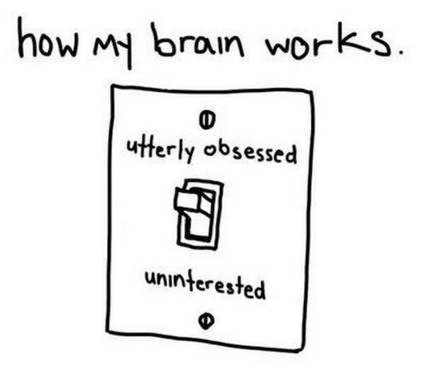The 3 Steps To Becoming Stress-Proof
.
1) Know What Really Works
Most of the things you instinctively do to relieve stress don’t work.
The APA’s national survey on stress found that the most commonly used strategies were also rated as highly ineffective by the same people who reported using them. For example, only 16 percent of people who eat to reduce stress report that it actually helps them. Another study found that women are most likely to eat chocolate when they are feeling anxious or depressed, but the only reliable change in mood they experience from their drug of choice is an increase in guilt.
So what does work?
According to the American Psychological Association, the most effective stress-relief strategies are exercising or playing sports, praying or attending a religious service, reading, listening to music, spending time with friends or family, getting a massage, going outside for a walk, meditating or doing yoga, and spending time with a creative hobby. (The least effective strategies are gambling, shopping, smoking, drinking, eating, playing video games, surfing the Internet, and watching TV or movies for more than two hours.)
2) It’s All About A Feeling Of Control
As is often said, stress isn’t about what happens to you, it’s how you react to it. This is true.
We’re not as stressed when we feel in control. Again, the emphasis is on feel. Even illusory feelings of control can eliminate stress. (This is the secret to why idiots and crazy people may feel far less stress than those who see a situation clearly.)
Anything that increases your perception of control over a situation — whether it actually increases your control or not — can substantially decrease your stress level.
Steve Maier at the University of Boulder, in Colorado, says that the degree of control that organisms can exert over something that creates stress determines whether the stressor alters the organism’s functioning. His findings indicate that only uncontrollable stressors cause deleterious effects. Inescapable or uncontrollable stress can be destructive, whereas the same stress that feels escapable is less destructive, significantly so… Over and over, scientists see that the perception of control over a stressor alters the stressor’s impact.
Why do people choose to become entrepreneurs when working for yourself often means more hours for less money? Control:
A number of studies show “work-life balance” as the main reason people start their own small businesses. Yet small business owners often work more hours, for less money, than in corporate life. The difference? You are able to make more of your own choices.
Do things that increase your control of a situation ahead of time. According to one study, the stress management technique that worked best was deliberately planning your day so that stress is minimized.
The best way to reduce job stress is to get a clear idea of what is expected of you.
The trick to not worrying about work stuff while at home is to make specific plans to address concerns before you leave the office.
3) You Need Some Stress To Be Your Best
Heavy time pressure stresses you out and kills creativity. On the other hand, having no deadlines is not optimal either. Low-to-moderate time pressure produces the best results.
Via The Progress Principle: Using Small Wins to Ignite Joy, Engagement, and Creativity at Work:
If managers regularly set impossibly short time-frames or impossibly high workloads, employees become stressed, unhappy, and unmotivated—burned out. Yet, people hate being bored. it was rare for any participant in our study to report a day with very low time pressure, such days—when they did occur—were also not conducive to positive inner work life. In general, then, low-to-moderate time pressure seems optimal for sustaining positive thoughts, feelings, and drives.
In his book The Art of Learning, Josh Waitzkin discusses one of the key elements that pro athletes like Jordan use to perform at their peak: spontaneous relaxation.
“…one of the most telling features of a dominant performer is the routine use of recovery periods.”
They’re not Zen masters who experience no stress. Far from it. But they’ve taught themselves to turn it on and off. The pros are able to fully relax during the briefest periods of rest. This prevents them from burning out during hours of play.
Via The Art of Learning:
The physiologists at LGE had discovered that in virtually every discipline, one of the most telling features of a dominant performer is the routine use of recovery periods. Players who are able to relax in brief moments of inactivity are almost always the ones who end up coming through when the game is on the line… Remember Michael Jordan sitting on the bench, a towel on his shoulders, letting it all go for a two-minute break before coming back in the game? Jordan was completely serene on the bench even though the Bulls desperately needed him on the court. He had the fastest recovery time of any athlete I’ve ever seen.
One Last Thing:
I’m stressed RIGHT NOW!!! What’s the quickest, easiest thing to do?!?!?!
Watching a video of a cute animal can reduce heart rate and blood pressure in under a minute.
Via Richard Wiseman’s excellent book 59 Seconds: Change Your Life in Under a Minute:
In an innovative study, Deborah Wells examined whether merely looking at a video of an animal can have the same type of calming and restorative effects as those created by being in its company… compared to the two control conditions, all three animal videos made the participants feel much more relaxed. To help reduce your heart rate and blood pressure in less than a minute, go online and watch a video of a cute animal.
Here you go:
Join over 151,000 readers. Get a free weekly update via email here.
Related posts:
How To Stop Being Lazy And Get More Done – 5 Expert Tips
6 Things The Most Productive People Do Every Day
New Harvard Research Reveals A Fun Way To Be More Successful




